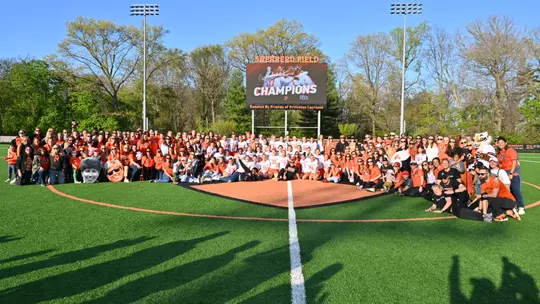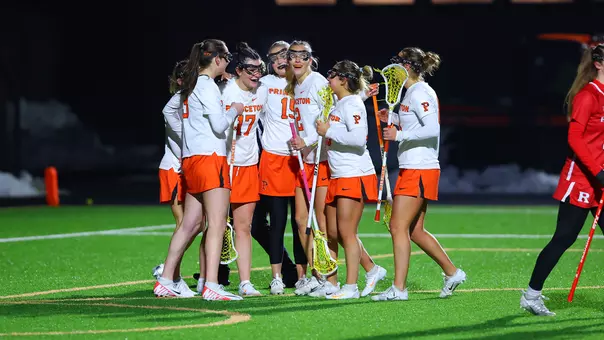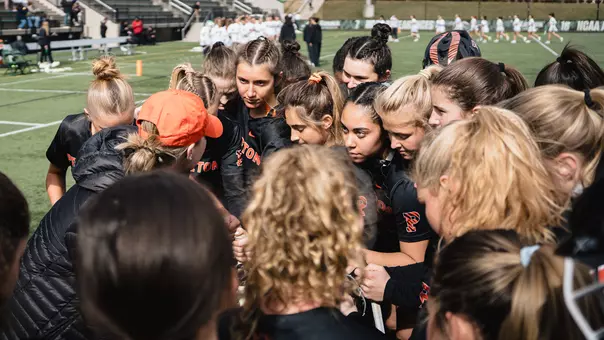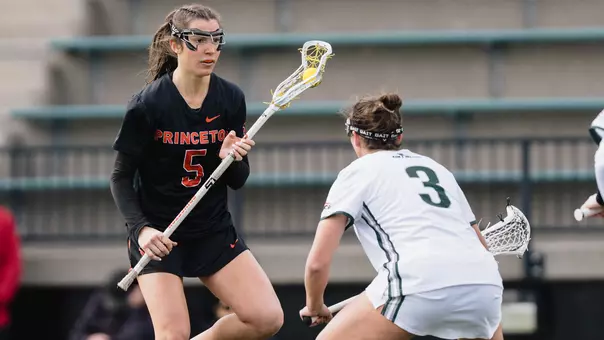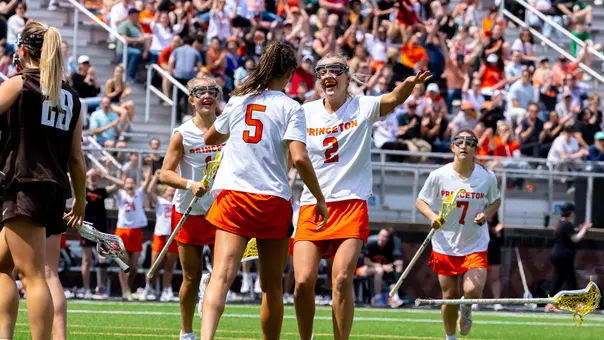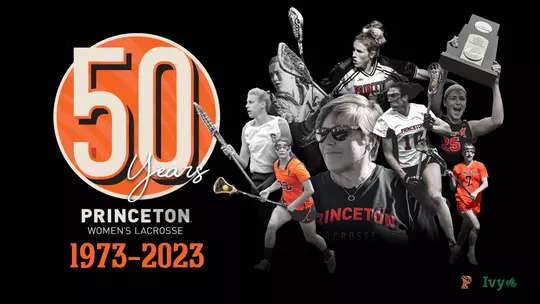
Women's Lacrosse Celebrates 50 Years On Saturday
4/11/2023
NOTE: The following feature is adapted from the women's lacrosse sections of “I Can Do Anything: Stories From The First 50 Years of Women's Athletics at Princeton University” which was published in 2020 during the department's overall celebration marking 50 years of women's athletics. Where applicable, the text has been updated to reflect the 2022 season's accomplishments. To order the publication, click here.
There aren’t too many programs anywhere in college athletics who have been as much of a reflection of their head coach as the Princeton women’s lacrosse team. Chris Sailer, a member of the National Lacrosse Hall of Fame who was the face of the program from 1987 to 2022, was a model of consistency, intensity, integrity and success, and her teams were all of that and more.
Under Sailer’s leadership, Princeton won three NCAA championships, in 1994, 2002 and 2003. There had been 15 Ivy League championships on her watch by the 50th anniversary – and 16 overall through the 2022 season, and the Tigers won six of the first 11 Ivy League tournaments.
By 2020 Princeton women’s lacrosse had made 27 NCAA tournament appearances – that number now stands at 28 -- and Sailer was the coach for 27 of those. In short, Sailer has guided generations of Princeton women’s lacrosse players to their fullest potential, and the program’s results clearly reflect that.
Sailer was the third Princeton women’s lacrosse coach. The program started in 1973 under the direction of Penny Hinckley, who also coached field hockey and basketball as the first full-time women’s coach at Princeton. Hinckley’s lacrosse teams never played more than eight games in a season. One of the great early players was Emily Goodfellow, who became the first lacrosse player to win the von Kienbusch Award, which she did in 1976.
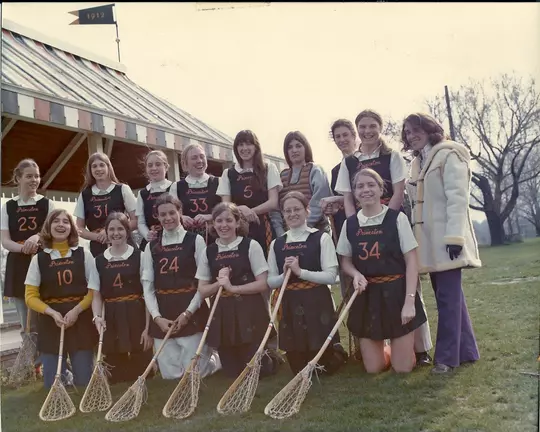
Betty Logan took over the team in 1978 and coached it for nine seasons, taking Princeton to the 1979 and 1980 AIAW national tournaments and the 1983 NCAA tournament, where Princeton defeated Dartmouth 12-10 in its first tournament game.
Logan was the head coach when Barbara Russell won the 1981 von Kienbusch Award while also playing field hockey for Logan. Natalie Bocock, also a field hockey player as well, became the program’s first All-American and U.S. national team player in 1983, while Sue McCarter became its second All-American in 1986. Both Bocock and McCarter were von Kiensbusch winners.
Sailer took over in 1987. By 1989 she had the Tigers in the NCAA tournament, winning in the first round against Virginia. By 1992 there was a Final Four appearance. The next year, 1993, saw the Tigers lose 8-6 to Virginia in overtime in the NCAA championship game.
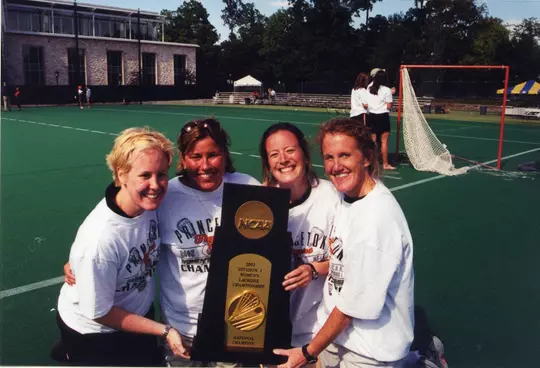
Back in the Final Four in 1994, Princeton had to erase two recent losses to get the big trophy. First, there was Virginia in the semifinals. Princeton led 13-10 late before UVA scored three times in two minutes to tie it, forcing overtime again. This time, it was Lisa Rebane who scored the game-winner in the 14-13 Tiger victory.
Next up was Maryland, on its home turf at Byrd Stadium, the same Maryland team that had beaten Princeton 12-10 in the regular season finale. Princeton, wearing t-shirts that said “No. 2 Just Won’t Do,” defeated the Terps 10-7 in the championship game. Rebane, Jenny Bristow, Casey Coleman and Janice Petrella scored twice each in that game, and the defense, led by goalie Erin O’Neill and defender Liz Fagan, shut out Maryland – the highest scoring team in the country – for the final 25 minutes.
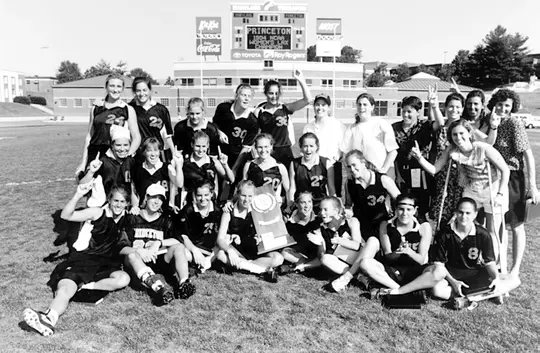
Princeton played in five more Final Fours, reaching the final twice more, before the next championship came in 2002. Princeton lost its opener that year to Georgetown and then won 19 in a row after that, fittingly winning the title by taking down the Hoyas 12-7 after hammering North Carolina 16-2 in the semifinal.
Princeton would repeat in 2003, defeating Loyola 5-3 in the semifinal and then Virginia 8-7 (of course in overtime) in the final. This time, Princeton trailed by a goal in the final two minutes before Alex Fiore forced a turnover and Whitney Miller tied it off a feed from Lindsey Biles. That led to the gamewinner in OT, this time courtesy of Theresa Sherry.
Princeton reached the NCAA final a year later, losing to Virginia. The Tigers played in the NCAA tournament 13 more times in the next 15 years, reaching the quarterfinals eight times. Rachael Becker made history after the 2003 season by becoming the only Princeton player and the only defensive player ever to win the Tewaaraton Award as the outstanding player in college lacrosse.
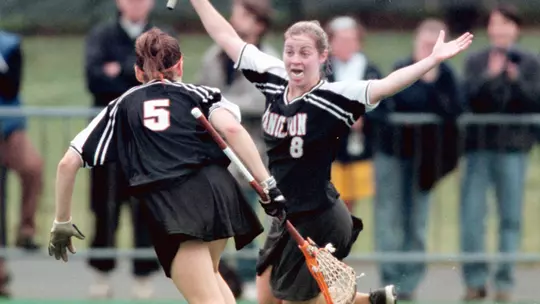
Julie Shaner became Princeton’s first Tewaaraton finalist in the first year of the award, 2001. Becker was a finalist in 2002 before winning in 2003, and Sherry and Biles were finalists in 2004 and 2005. Olivia Hompe was a finalist in 2017.
When she graduated, Hompe was Princeton’s all-time leading scorer with 285 career points, breaking the previous record of 270, held for nearly 20 years by Crista Samaras. Hompe's record didn't last as long as Kyla Sears '22 finished off a stellar career of her own with 307 points in just over three seasons.
Hompe broke the record that Samaras set during a huge senior season in 2017, when she scored 110 points. Besides Hompe, only Sears has eclipsed the century mark for points in a season, hiting 100 on the dot during her senior campaign in 2022.
Becker and Lauren Simone were named to the NCAA’s 25th anniversary team.
The Princeton women’s lacrosse team has had five players who were three-time first-team All- Americans: Becker, Samaras, Sherry, Rebane and Amory Rowe (Class of 1994).
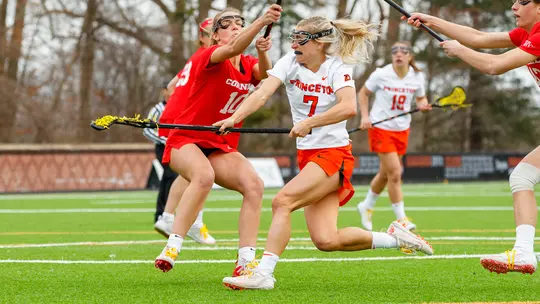
Rachael Becker laughs as she remembers how old she was when her father first described her as “insanely competitive.”
“I was five. My first sport was t-ball. I already wanted to win. My father says he always knew I’d be fierce.”
Becker’s ferocity was obvious to anyone who ever saw her play for Princeton in either field hockey or lacrosse. She would become an All-Ivy League selection in the former; she would become a legend in the latter. In fact, she has stood alone in college lacrosse history as the first – and, as women’s athletics at Princeton turned fifty, the only – defender to win the Tewaaraton Award as the outstanding player in college lacrosse. No other defender, male or female, could match that achievement.
It’s no wonder that she’s in the National Lacrosse Hall of Fame, inducted in 2019. Or that she’s a much sought after speaker and commentator and a leader in men’s and women’s lacrosse on the professional level. She has no interest in losing, ever, and she never has. And that’s part of the reason why the 2003 NCAA semifinal was such a strange moment in her life. For every national championship that Princeton women’s teams have competed for, there has never been another moment like the 2003 semifinals, and no other Princeton women’s team has ever had to deal with the emotions that the 2003 team did. Princeton won NCAA women’s lacrosse championships in 1994, 2002 and 2003, and in each case Princeton defeated a team in the championship game that it had lost to during the regular season. The first two of those teams had the kind of incredible stories that all championship teams have to have. It’s just that nothing can compare to what happened in Syracuse in the 2003 Final Four.
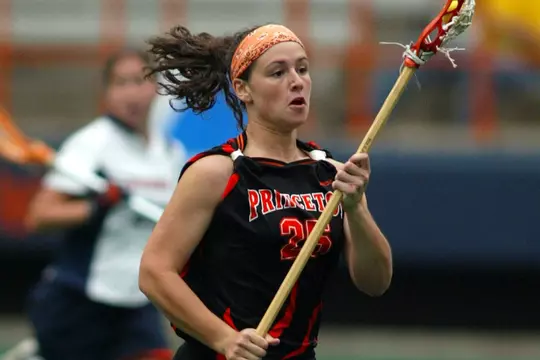
Chris Sailer had been a two-time first-team All-Ivy League selection at Harvard before graduating in 1981. She became Princeton’s head women’s lacrosse coach in 1987, taking over a program that had not yet reached the national semifinals. It took her until 1989 to get Princeton there, with a second trip in 1992 and the first championship game appearance in 1993, when the Tigers lost 8-6 in overtime to Virginia.
“It was the classic incremental improvement each year,” says Kim Simons, Class of 1994, like Becker a field hockey (three-time All-Ivy League) and lacrosse player at Princeton and a three-time All-American in lacrosse. “Our culture, our attitude, our expectation grew each year that I was part of the program. It was clear that Chris was planning on having us get better and play for the national championship. When you’re building a program, it takes buy in, more and more buy in, more and more players who are really committed to doing whatever it took. As a freshman, I was along for the ride. My sophomore year seemed to be a significant shift that laid the groundwork for the next two years, which was a two-year journey to becoming NCAA champion.”
The loss in the 1993 championship game had been crushing. Princeton had defeated Maryland 7-6 in the semifinal on Maryland’s home field, where the Terps had won thirty-four straight prior to that game. The game winner came courtesy of a goal from Simons. This sent Princeton into the championship game against Virginia, where fate was not on the Tigers’ side.
Princeton led 3-1 midway through the first half and had been in control when the first of two lightning delays stopped the game and ended the momentum. The game was 5-5 at the end of regulation, and in the women’s game that meant playing two full three-minute overtime periods, as opposed to having the first goal win. Princeton got the first goal, from Lisa Rebane, to go up 6-5, but, unfortunately, that wouldn’t end the game. Then Virginia tied it and followed with two more goals to get the win and the championship.
“A loss like that can do one of two things,” Simons says. “That was an experience that was amazing and devastating all at once. Nothing leaves a mark on a team like losing in overtime in the national championship game. It’s either going to crush you and you won’t overcome it, or it motivates you more for the next season. That year gave us a taste of what it feels like, and we were very determined.”
Also like Becker, Simons has a long post-Princeton resume in the sport of lacrosse, including coaching on the collegiate and national team levels and working in player development.
“We were so focused on winning the national championship,” Simons says. “We’d accept nothing else. I’ve been around sports a long time, coaching and playing. We were the most obsessed team that year. We were so focused, so driven. By midseason it was clear that this is how we were going to be doing things and this is what we’re doing. The level of competition on the field every day in practice was amazing. What happened the year before fueled us. Everyone loves to win. To love to compete to make it so we could win was part of our recipe.”
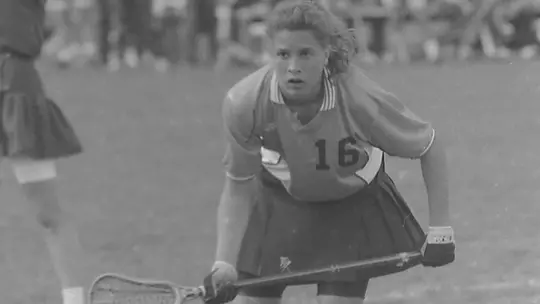
Princeton won its first fourteen games in 1994, though they were not all easy. There were overtime wins against Harvard and Dartmouth to win the Ivy League championship, and there was also a 15-14 overtime win over Virginia during the regular season.
The fourteen-game run ended with a 12-10 loss to Maryland, however, and the Final Four shaped up as a two-game gauntlet of the team that had haunted the Tigers a year ago (Virginia in the semifinals) and then very likely the team that had just ended the winning streak (Maryland in the final).
Princeton would lead the semifinal 13-10 with less than four minutes to go, but this was Virginia, so nothing would be easy. The Cavaliers rallied to tie it at 13-13 and force overtime.
“My memory of the semifinal was that all the work that happened all year long gave us the confidence and the sense that this was our destiny,” Simons says. “It would have been easy to panic and say ‘here we go again.’ I don’t remember any of that feeling of panic. It was just one more obstacle to overcome to win this thing.”
And win it Princeton did, again getting a goal from Rebane and this time shutting the door on the Cavs, winning 14-13.
The championship game saw Princeton hold Maryland to nearly half the number of goals from the game two weeks earlier, as goalie Erin O’Neill made nineteen saves, twelve in the second half as the Tigers shut out Maryland for the final 25 minutes, to win 10-7. Bristow, Rebane, Casey Coleman and Janice Petrella scored twice each, while Liz Fagan was everywhere on the defensive end. The game had been tight throughout the first half, and it was 6-6 at intermission, before Princeton simply dominated.
“It was so dramatic,” Simons says. “I never felt like we had it won until we actually won. I remember watching the clock tick down and not feeling it was over until the buzzer went off. They were that good. I think we shocked them a bit. I certainly don’t remember relaxing at any point. We had visualized what the scoreboard would look like. We had a lot of focus on the scoreboard after the game. That had been one of the things we talked about as a team.
Even talking about it now, this all brings back total joy. When you win the national championship you’re the best in that moment in time. No one can ever take it away from you. To be able to experience that with your teammates and friends who worked as hard as you did for your dream, I’ll be forever grateful for it.”
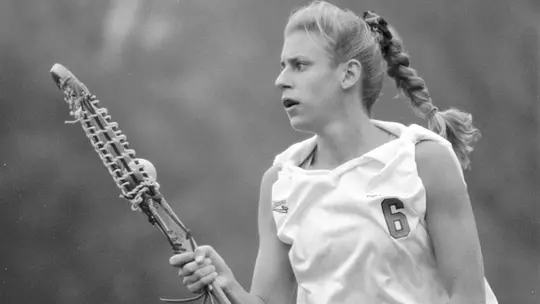
When it came to the next Princeton NCAA title, Kim Simons’ memories aren’t quite as fond. In fact, she was probably the only Princeton graduate who wasn’t rooting for the Tigers that day in May 2002.
Why is that? Well, it’s because she was the coach on the other bench. Simons had become the head coach at Georgetown just two years after graduating from Princeton, and she had built the Hoyas into a powerhouse by the early 2000s. Her 2001 team reached the NCAA championship game against Maryland and rallied from an 8-1 deficit to send it to overtime, only to fall 14-13 in what Simons called a “devastating” loss.
The 2002 season began for Georgetown with a win over Richmond. Next up was Princeton, in the Tigers’ season opener. Becker was a junior in 2002, having played on teams that reached the championship game her freshman year and the semifinals her sophomore year, with losses to Maryland both times. Simons and Georgetown defeated Princeton in that 2002 regular season game, which left the Tigers 0-1 and Sailer with a choice of how to handle it.
“We lost that game, and we all got messages on our voicemails,” Becker says. “It said practice would be at 6, under the lights. It said we didn’t need equipment and that nobody was guaranteed their spot anymore, that we were all fighting for positions. We all expected that we would be running and doing really hard drills. Instead, Chris told us all to get into cars. We were going to Chuckie Cheese. Chris realized we’d been putting too much pressure on ourselves. We were tight, and that loosened us up. It was coaching genius from Chris Sailer. Everyone chilled after that. We knew we were going to be okay.”
They were more than just okay from that point. They were perfect. The Tigers would not lose again, rolling through their next nineteen games, including a 7-0 sprint through the Ivy League in which no team stayed within four goals of Princeton. There was also a 13-9 win over Maryland in the second-to-last game of the regular season.
Princeton opened the NCAA tournament with a 25-3 win over Lemoyne and then an 11-5 win over Notre Dame to reach the Final Four, where the Tigers were flawless in a 16-2 win over North Carolina in the semifinals. Next up would be Simons and Georgetown, the only team to have beaten Princeton that year, in the championship game.
“The game was tied at the half, but I knew we were pretty much as maxed out as we could be and that Chris would make great adjustments,” Simons says. “That loss wasn’t as rough as the one against Maryland the year before. If we couldn’t win, obviously Princeton would be the team I would have wanted to do it.”
Princeton pulled away in the second half to win 12-7. There would be eight second-half Princeton goals, and seven of them came from seniors, led by a three-goal, one-assist performance by Simone to win Most Outstanding Player.
“There were a few moments for me that really stick out from that game,” Becker says. “First, I got an early yellow card, and I told myself that I couldn’t get another one and get kicked out. I remember Simone was playing out of her mind that day. And I remember with about five or six minutes left, we were up five or six or so. I looked at Brooke [Owens] and we both said we were going to win this game. It was such an adrenaline rush. We couldn’t stop jumping up and down. We were super excited, so happy we had done it.”
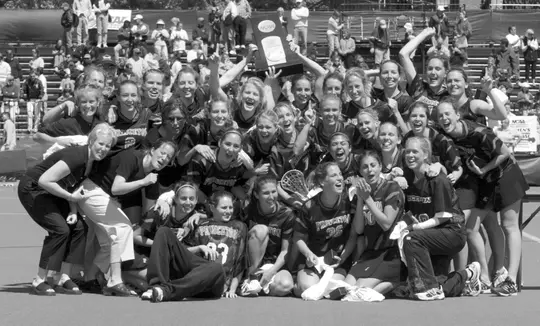
Princeton had rolled to the 2002 NCAA championship, but then graduated a class that included first-team All-American Lauren Simone and second-team All-Americans Charlotte Kenworthy and Brooke Owens. The 2003 Tigers started off 1-3, with losses to Loyola, Virginia, and Duke before crawling their way back, winning eleven of their final twelve regular season games to win the Ivy League title and to enter the NCAA tournament unseeded. Princeton then knocked off Lemoyne and Ohio State to get to the Final Four, at the Carrier Dome in Syracuse.
Princeton’s coach in 2003 was the same woman who had coached the team to the first two championships. Like Becker, she is also in the National Hall of Fame, and, despite her height, she is a giant in both the history of women’s lacrosse and in the history of Princeton Athletics.
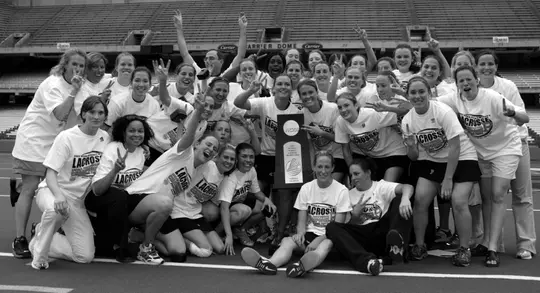
The 2002 season saw Princeton outscore its last two opponents by a total of 28-9. The next year would not be anything remotely as easy.
The semifinal matched Princeton against the topseeded and undefeated Loyola Greyhounds. Loyola was more than just the No. 1 team in the country, though. Loyola was playing for its head coach, the beloved Dianne Geppi-Aikens, who was nearing the end of a long, courageous fight against brain cancer.
“There was nobody rooting for us,” Becker says. “You had a respected woman who was dying and a team that was trying to win a championship for her. I wouldn’t have been rooting for us either. Of course we wanted to win, but it was a really difficult emotional position for us. We knew if we beat them, that would be the end for her. We had to balance being happy for ourselves while being so sad for what was happening to her.”
It’s nearly impossible to describe just how emotional it was in the Carrier Dome, nor just how much it weighed on Princeton to have to play against a team going through that. It would be a tight defensive game that Princeton would win 5-3 on a pair of Elizabeth Pillion goals and scores from Theresa Sherry, Whitney Miller and Leigh Slonaker. Geppi-Aikens would pass away less than a month later, at the age of 40.
Princeton had to turn itself around quickly after going through that, with the championship game against Virginia two days later. And once again Princeton had to play a team it had already lost to, this time 13-8 to fall to 1-3 on March 16. This time Virginia jumped out 3-0, but Princeton would not fold.
Instead, the Tigers got two goals by Sherry and one by Pillion and it was only a 4-3 deficit at the half. It was still a one-goal game late, but Alex Fiore forced a turnover to get Princeton possession and then Miller tied it at 7-7 with 1:39 to play. Virginia won the draw, and that’s when Becker made the biggest play of her career. The Cavaliers got the ball to Amy Appelt, their leading scorer and a first-team All-American. Three times she attacked Becker, and three times Becker did not allow her to get to the cage. After that it was overtime, where Sherry scored the only goal to give Princeton the 8-7 win.
“I knew Amy was great,” Becker says. “I knew she was going to go to the goal. It was like time stopped around us. I knew I had to stop her. The national championship was on the line. We were a team from top to bottom. Whenever we needed someone to step up, someone did. It didn’t matter who it was. Everyone was just perfectly suited to her role. Once the game went to overtime, my mother walked out. She said it was too hard to watch. That was as intense a national championship game as you could ever want.”
After her second-straight title, and Princeton’s third overall, Becker then added the Tewaaraton in the history-making moment for defensive players. The entire class of women’s lacrosse seniors caravanned together to D.C. for the ceremony.
That Tewaaraton Award now sits on a shelf in Becker’s basement. It’s a symbol of the greatness of one player on a team that achieved greatness together, reaching the pinnacle of college lacrosse in back-to-back years. For Becker, the memories are seared in her mind no matter where she is, just as they are for each of the women who won NCAA championships with Princeton lacrosse
